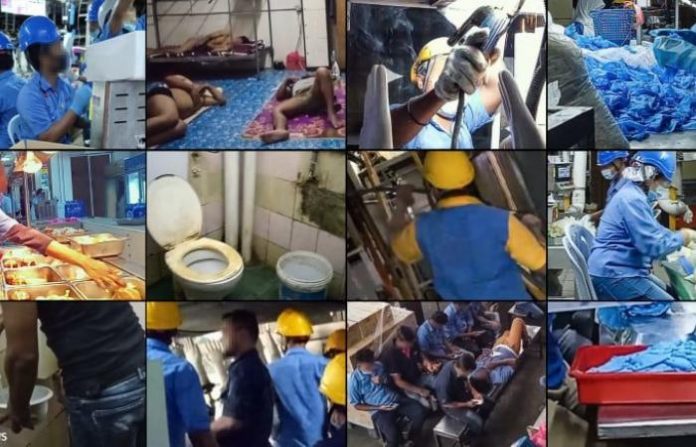
The wall of noise is constant as the workers manually check, sort and pack a seemingly endless supply of disposable gloves into boxes destined for international markets like Canada.
The production line, filled mostly with migrant workers, is cramped. Yet COVID-19 protocols like sanitizing, physical distancing or mask-wearing, meant to protect against the spread of the coronavirus, don’t seem to be enforced at this Malaysian factory.
“They just want [you] to work. They just want product. They don’t care about the worker,” said one employee from Nepal, who works 12 hours every day.
In spite of these health risks, some employees say they can’t leave their jobs. They say they have significant debt — often borrowed at the hands of unscrupulous lenders — having paid recruitment agencies massive fees to line them up for their jobs.
“I don’t have any choice, I have to work [to pay off my debt],” said another worker from Bangladesh, who makes around $3 an hour and is paying back loans two years after starting his job.
As global demand for personal protective equipment (PPE) surges during the pandemic, so has the human cost for those making it overseas, an investigation by CBC’s Marketplace has found.
The investigation into the global PPE trade revealed that some of the life-saving equipment Canadian health-care workers are using appears to be made in sweatshop-like conditions — raising doubts about Canada’s commitment to international human rights and its ability to prevent unethically sourced goods from entering the country.
“We can say without doubt that the [glove] industry remains a hotbed of systemic forced labour and modern slavery,” said Andy Hall, an international migrant worker rights specialist based in Southeast Asia. “[Migrant workers] are not seen as human beings…. They’re often treated as second-class citizens and systemically abused.”
Several Canadian companies that have tens of millions of dollars in PPE contracts with the federal government imported goods from the Malaysian manufacturers Marketplace investigated.
“Canada is tainted and Canada is complicit in this abuse that’s going on,” said Hall.
Canada, through import laws, prohibits the entry of goods that are produced with forced labour, which according to the International Labour Organization (ILO) can include such indicators as debt bondage, restriction of movement, excessive overtime and poor living conditions.
Yet according to records reviewed by Marketplace, millions of disposable gloves manufactured by Malaysian companies in conditions that experts say have the hallmarks of forced labour have come into our ports.
Hidden camera footage also showed unsafe working and poor living conditions inside a Malaysian factory, which Hall described as “really, really appalling” after viewing the video.
Marketplace interviewed 23 current and former migrant workers from across the disposable glove industry in Malaysia who detailed various stories of alleged exploitation: situations of debt bondage, deceptive recruiting practices, passport retention, excessive overtime, abusive workplaces and deplorable living conditions.
Gloves of all types — nitrile, vinyl, latex — are used by health-care workers in many situations, including swabbing, intubating and examinations. Some health-care professionals can go through several boxes of gloves a week.
“The only reason I haven’t gotten sick, it isn’t just luck — it’s PPE,” said Dr. Nadia Alam, a family doctor and anesthesiologist in Georgetown, Ont. “It makes me mad that nobody’s taking care of [these workers]…. It’s despicable, these kind of practices.”































